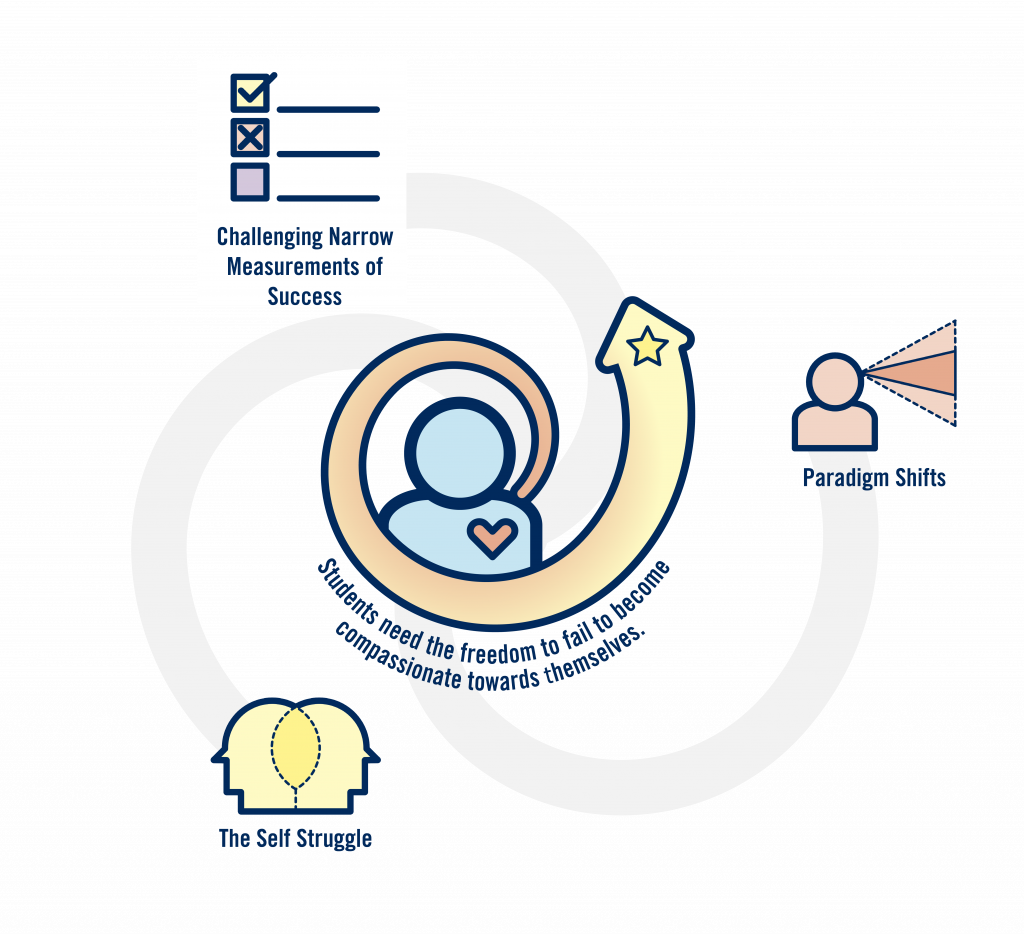


Written by Sanskriti Maheshwari, Rosemarie Shephard, and Amal Yusuf, Data Analysis Researchers for the Let’s Talk About Failure project

The Innovation Hub partnered with the Division of Student Life Academic Resilience Initiative to learn about UofT students’ experiences with failure: how they define failure, how they endure it, and the impact it has on their lives. We explored existing data on the topic in our archive of over 600 interviews and reached out to students at UofT to take part in our dialogue-based feedback sessions. We approached this project with the intention of hearing from and listening to students’ stories surrounding failure in their own words and on their own terms.
Coming To Terms With Failure
Failure, a common part of self-growth and learning, does not appear to be formative of growth and learning at UofT. The university takes pride in its excellence in research and teaching, but this narrative of excellence is not always one that students identify with, and often results in students feeling alienated in their university experience. They struggle with experiencing the hard feelings of failure.
In this project, we found that students need the freedom to fail in order to be more compassionate towards themselves. Through student stories, we learned that this might happen through:

Challenging Narrow Measurements of Success: Students focused on not achieving academic or career goals that they saw as key to their success at UofT. This prompted students to evaluate themselves critically, both in regards to their own goals, expectations, and the successes of their peers.
“In my first year, I didn’t do really well and it wasn’t just for one course it was multiple courses over and over, not getting the As that I had in high school. So that really brought me down in first year. And especially seeing other people around me and their grades—they were significantly better so that really brought me low as well.”

The Self Struggle: The experience of failure often impacted a student’s self-esteem. In addition to the negative emotions and mental health impacts, students would also feel alienated from their peers, whom they felt were succeeding where they were not.
“I’ve been an organized person whose pretty academically oriented, but last semester was just a lot of deadlines, and I started mixing up deadlines and forgetting them, and I felt really like I’m not supposed to be this kind of person.”

Paradigm Shifts: Failure can also be transformative. As students experienced failure, their perspectives on failure changed with time, and they realized that failure was simply a part of their story and not the entirety of their identity.
“If I failed, it’s not because of me, but it is because of so many other factors that have contributed to that being the outcome. It’s definitely not easy, but I just felt the way grad school has taught me is just to be resilient and patient because it’s a long way.”
A Journey of Failure to Self-Compassion
Failure can be an incredibly difficult journey for a student to embark on, and one that requires self-compassion to see through. Fostering student self-compassion is both an individual and collective effort that involves every member of the UofT community, from students to staff and faculty. By working together, we can create a space where strengths-based approaches are used to meet student self-compassion needs. Students need and deserve to be able to courageously embrace their fears in the face of failure.
In our final report, we also provide a journey map and set of ‘Best Practices for Student Self-Compassion’, designed so that we can all navigate feelings of failure through self-compassion. Through this resource, we can begin this journey together. Here are some (of many!) ways in which this can be possible:
- Sharing Our Personal Failures: By having a space where students can share their personal failure stories, we can dispel the prevailing narrative of excellence at UofT. This would also allow students to seek out connections with others.
- Normalizing Change: Students will often have to contend with disappointed expectations. By normalizing and embracing ideas of change and adaptability, we can remind students that, despite such changes, life outcomes can still be positive.
- Kindness Counters Self-Criticism: Every student deserves to have their feelings heard without the fear of evaluation. Providing a time and space for students to become attuned to their feelings, along with the opportunity to share their stories of failure, can be very beneficial, especially when those stories are consistently treated with kindness. Sharing your own stories can be helpful too – creating a space of shared vulnerability can help foster connection and empathy, which can make all the difference in preventing feelings of alienation and devastation.

With fostering self-compassion as a community, we can work towards designing a holistic culture of care at UofT. To learn more about this project and our ongoing work for the UofT community, click the button below to access our full report!
0 comments on “What We Learned from the ‘Let’s Talk About Failure’ Project”